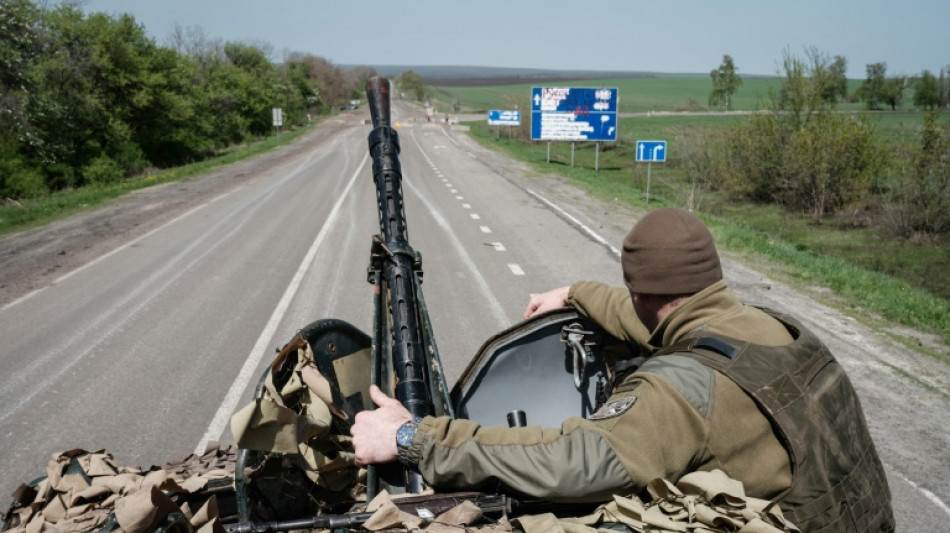

US moving 'heaven and earth' for Ukraine to defeat Russia
Washington pledged Tuesday at a summit of major allies to move "heaven and earth" to enable Ukraine to defeat Russia as the UN chief pleaded in Moscow for aid and civilian evacuation corridors.
"Ukraine clearly believes that it can win and so does everyone here," US Defense Secretary Lloyd Austin told 40 allies gathered at the Ramstein Air Base in Germany two months into Russia's invasion of its western neighbour.
The goal is "to build up Ukraine's defences for tomorrow's challenges," Austin said, and Washington is "going to keep moving heaven and earth so that we can meet" Kyiv's needs.
Ukraine's President Volodymyr Zelensky has been pleading for heavier firepower to push back the Russian advance in the Donbas, but allies are wary of being drawn into a conflict that could spiral into an outright military confrontation between Moscow and NATO.
Germany announced it would send anti-aircraft tanks to Ukraine, bowing to pressure to drop the cautious stance it has taken since the invasion was launched on February 24.
UN Secretary-General Antonio Guterres, visiting Moscow, urged Russia and Ukraine to cooperate on opening humanitarian corridors for evacuating residents from war zones -- after Ukrainian accused Russian forces of refusing to guarantee the safety of those fleeing.
He also called for an independent investigation into "possible war crimes" by Russian forces after reports of widespread civilian killings in Ukraine.
Russian Foreign Minister Sergei Lavrov insisted that "we are ready to cooperate with our colleagues from the UN to alleviate the plight of the civilian population" in Ukraine.
- Moldova on edge -
The Kremlin also said that President Vladimir Putin again discussed "efforts made by Russia" on ensuring civilians' safety with his Turkish counterpart Recep Tayyip Erdogan.
On Ukraine's eastern front, where the country's best-known singer Sviatoslav Vakarchuk made a morale-boosting visit, a Ukrainian military press officer admitted the situation was difficult.
"It's far from rosy," said Iryna Rybakova, of the 93rd brigade.
"Of course, we were prepared for this war, especially the professional army, but for those who've been recruited, it's more complicated," Rybakova told AFP.
At the entrance to Barinkove, not far from the Russian lines, six Ukrainian soldiers were ready at any moment to dive into their trench, which they dig every day with a shovel.
"Otherwise, we're dead," said Vasyl, 51, who serves with his son Denys, 22.
Stoking fears of a wider conflict, several blasts were reported Tuesday in the neighbouring ex-Soviet state of Moldova, in the Russian-backed separatist region of Transnistria.
"Russia wants to destabilise the Transnistrian region and hints Moldova should wait for 'guests,'" Mykhaylo Podolyak, an adviser to Zelensky, wrote on Twitter.
- UN warns of eight million refugees -
Moldovan President Maia Sandu urged citizens to remain calm and said she had ordered heightened security measures including patrols and vehicle checks in Transnistria.
Radiation levels in Chernobyl are now back "at normal" following a weeks-long occupation by Russian forces that sent levels higher at "some moments", the head of the UN's atomic watchdog said.
"The radiation level, I would say, is at normal. There have been some moments when the levels have gone up because of the movement of the heavy equipment that Russian forces were bringing here and when they left," IAEA chief Rafael Grossi told reporters.
The UN is set to vote Tuesday on a resolution that would require the five permanent members of the Security Council -- which includes Russia -- to justify their use of a veto on joint resolutions.
The UN's refugee agency said that it now expects more than eight million Ukrainians to eventually flee their country, with nearly 5.3 million already out, and that $1.85 billion would be needed to host them in neighbouring countries, mainly Poland.
But despite the diplomatic scrambling, civilians bear the brunt of much of the fighting raging the south and east.
Russian strikes on Tuesday killed at least nine civilians in southern and eastern Ukraine, Ukrainian officials said.
In the city of Kharkiv, which has faced a barrage of Russian rockets since the war began over two months ago, children spoke to AFP about the bombings, their daily life and hopes for peace.
"I miss my kickboxing training and dance classes," said nine-year-old Alina, who has been forced to sleep in an underground car park.
"Victory would make me very happy. The war won't end straight away, but it will in a few weeks, I made a wish."
- 'Bombings constantly' -
In the south, two Russian missiles struck the industrial city of Zaporizhia, which has welcomed many civilians fleeing the besieged port city of Mariupol, regional authorities said.
Russian forces are expected to soon advance on the city, giving them the potential to seize Ukraine's largest nuclear power plant.
"The city of Kreminna has reportedly fallen and heavy fighting is reported south of Izium, as Russian forces attempt to advance towards the cities of Sloviansk and Kramatorsk from the north and east," the UK Ministry of Defence said in its daily analysis.
And in Mariupol, where some 100,000 residents remain trapped, Russian forces continued to pound the Azovstal steel plant where Ukrainian forces have been holding out alongside hundreds of civilians.
Russia's defence ministry, for its part, claimed it had used "high-precision weapons" to strike ammunition depots and two other targets in the Kharkiv region.
It also said it had shot down 13 drones operated by Ukrainian forces.
The World Bank warned that surging prices of energy and other commodities since the Russian invasion are likely to remain "historically high" through 2024.
burs-js/jm
A.Munoz--LGdM




